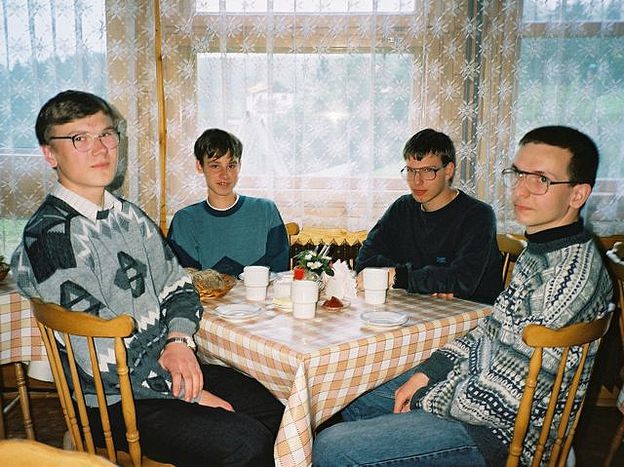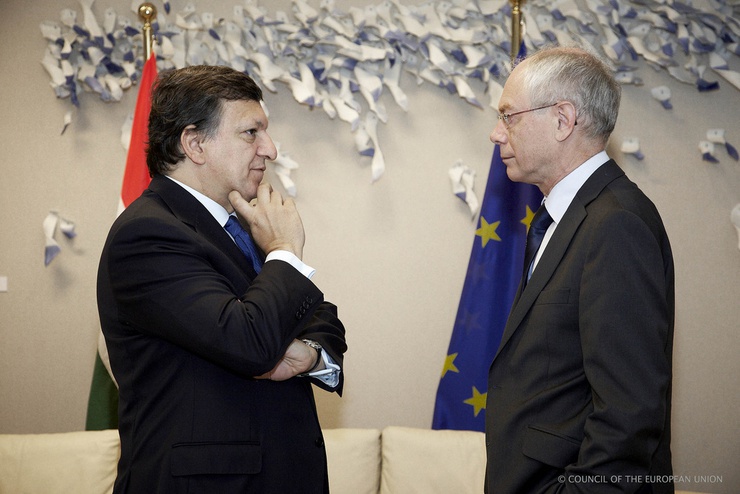
When I was at the EU in the seventies...
Published on
Translation by:
 theroxbox
theroxbox
For Europeans to find courage, we first have to be scared. So far it’s taken three big shocks to shake Europe into life: war in the 40s, an economic crisis in the 70s and the fall of the Berlin wall at the end of the 90s. The financial crash retakes the baton in the noughties. Time for the ‘euro-generation’ to take things into hand
Am I an optimist? What do you expect? I’m a European born at the end of the 50s, a member of the last generation to recognise the sound of tinplated toys (then came plastic), raised by parents who were convinced that the worst had passed. Their enthusiasm was contagious and we were open to infection.
War: what is it good for
The dream was relative to the tragedy: nobody wanted another war in Europe. They came together, yesterday’s enemies now unbreakable, a credit to the astonishing farsightedness of De Gasperi, Schuman and Adenauer, considered to be the founding fathers of the European union. ‘Excellent men are creatures of occasion. They don’t appear until the final hour and the wind puts them to the test,’ wrote Barbera Spinelli. The journalist and daughter of Alfredo Spinelli, citing Polish-born English novelist Joseph Conrad in a recent piece for the Italian daily newspaper that she co-founded, La Repubblica. Europe came from the perfect storm but rather than sinking, the sails were raised and she took off.
80s Europe was excited by its new goal: more exchanges, more movement, more wealth
However, success fades over time. Another scare was required to generate a further shake up. This came in the shape of the single market, with the European economic community (EEC) struggling to enforce an internal market in the 70s and 80s. It was only between 1992 and 1993 that the market was finally launched - merci, Mr. Delors. The then-head of the European commission which developed the plan for the single market was the son of the economic darkness of the 70s: an era of the energy crisis, inflation and uncertainty. Between 1979 and 1980 I myself was at the European commission in Brussels - ostensibly to prepare my thesis in international law, but in truth to smell out the world beyond provincial Italy. I saw up close that Europe was excited by its new goal: more exchanges, more movement, more wealth.
EU: because it’s worth it
In the 90s some people might have dreamed of taking a break from the whole thing. Nevertheless, the wall fell, communism ended and Europe, again startled by the change, found itself a third new challenge. Thanks to statesmen like Helmut Kohl (chancellor of Germany's reunification) and Romano Prodi (Italian former EU commission president), the European union was officially born. It opened the door towards the east to welcome in those who are less fortunate than us but no less European. A project so complicated, so costly, so imperfect, so exhausting: it didn’t matter. Travel from Gdansk to Lisbon today and you’ll know it was worth it.

The fourth shock is told in stories from the last few months: the EU’s 27 member states in debt, government promises and spending, dubious and aggressive markets, America refusing to help (quite the contrary). Was the launch of the euro as a single currency in 1992 premature? Perhaps, but it’s here and we must protect it (even with its eurobonds, dearest Angela). Will fear provoke a reaction once again? Only if the erasmus generation (in the posts of command it is waiting to fill) is able to bring the enthusiasm with which it has visited, got to know, studied, travelled, lived, tasted and loved Europe over the last twenty years. If it’s willing to defend Europe – and I believe it is – we’ll be in for a pleasant surprise.
As a continent, we’re ‘phobovoltaic’: we turn fear into energy. When calm we just stay put and sigh. I said all this to president Barroso over dinner when he asked for my opinion.
Beppe Severgnini has written for the Corriere della Serra newspaper i Italy since 1995 and has just published ‘La pancia degli italiani. Berlusconi spiegato ai posteri’ (Rizzoli 2010). Since 1998 he has led the ‘Italians’ forum from which this opinion piece was taken
Images: (cc) rockcohen; in-text (cc) europeancouncil/ both courtesy of Flickr
Translated from Europa, quattro spaventi salutari. Ora tocca alla generazione Erasmus.


